|
June 5, 2018
35th Annual Ontario Injured Workers'
Day
Injured Workers Make Their Voices Heard
at Spirited Rally and March in Toronto
PDF
35th Annual Ontario
Injured
Workers' Day
• Injured Workers Make Their Voices Heard at
Spirited Rally and March in Toronto
• Actions Around the Province
• Peterborough General Electric Retirees'
Proposals for Workers'
Compensation Reforms
35th Annual Ontario Injured Workers' Day
Injured Workers Make Their Voices Heard at
Spirited Rally and March in Toronto
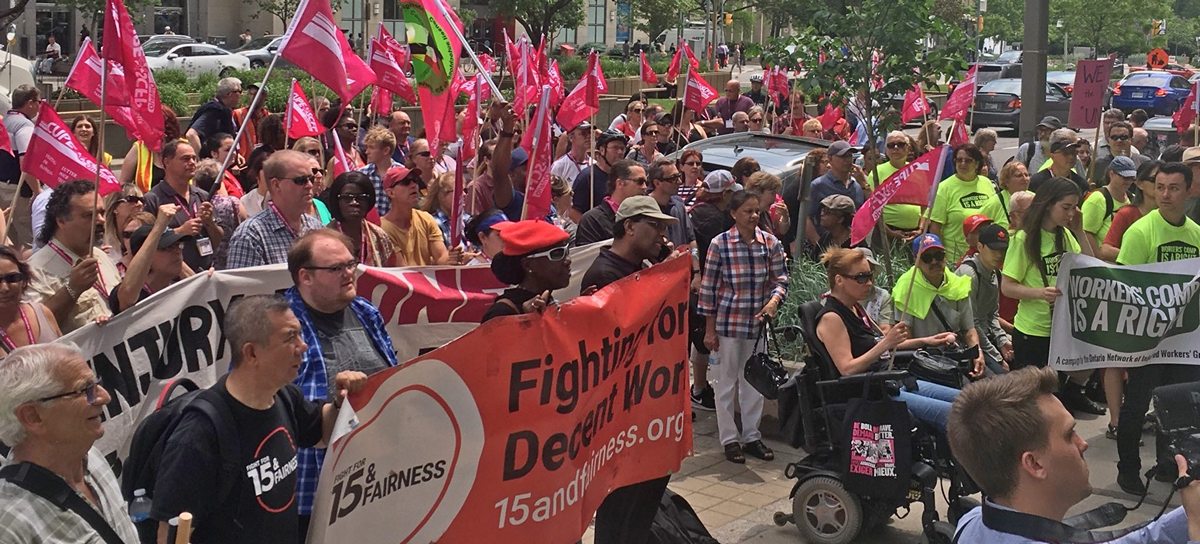
On June 1, Ontario Injured Workers' Day, more than 200
injured workers, including a busload of General Electric
retirees from Peterborough, along with many youth and many
attending for the first time, participated in a spirited rally and
march to demand the rights of all injured workers to full
compensation, health care and the supports they require to enable
them to live with dignity. They were joined by representatives of
Steelworkers Local 1005 from Hamilton, Toronto Steelworkers Area
Council, United Food and Commercial Workers Canada, Ontario Public
Service Employees Union, Unifor, and other unions, the Toronto
and District Labour Council and the Ontario Federation of Labour,
along with the South Asian Women's Rights Organization, the Workers'
Centre of the Marxist-Leninist Party of Canada and many more.
The rally welcomed the cyclists from the fourth Justice
for
Injured Workers' Bike Ride who successfully completed a tour
through towns in Northern Ontario from Elliot Lake to Sudbury,
organized by the
Ontario Network of Injured Workers' Groups and the McIntyre
Powder Project. The ride this year focussed on the diseases and
injuries suffered by many miners in the communities visited.
 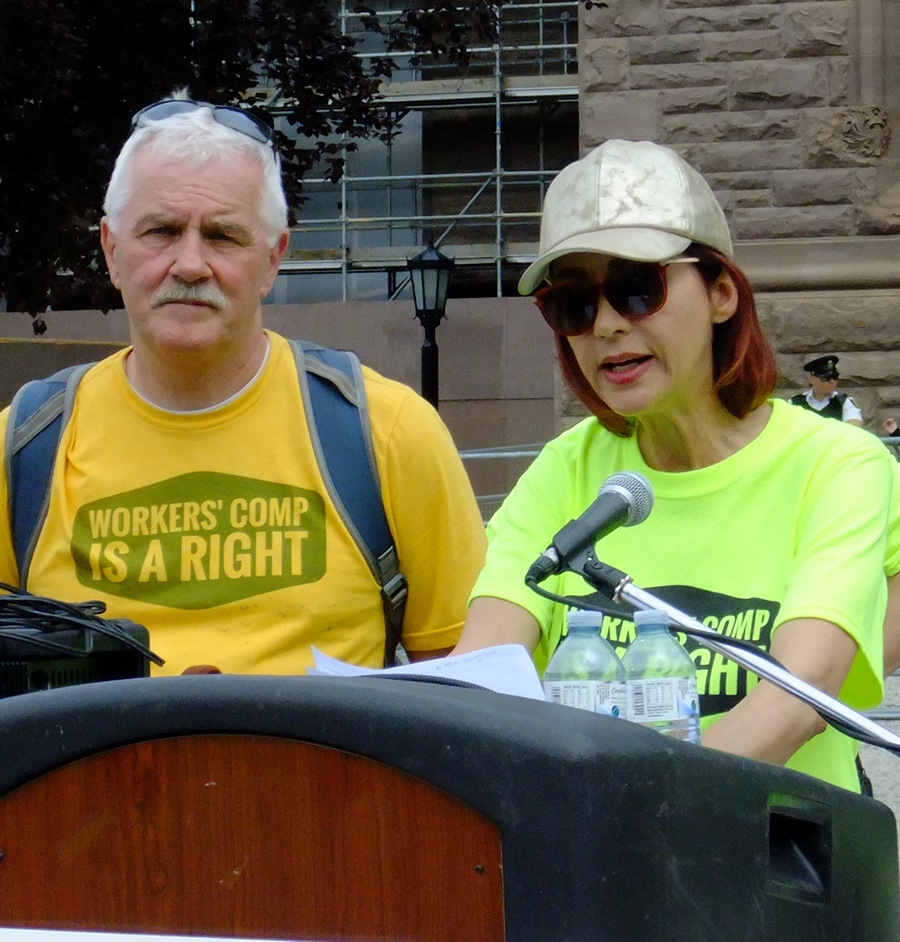

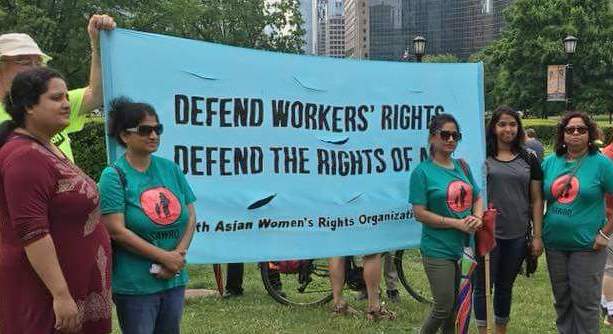 
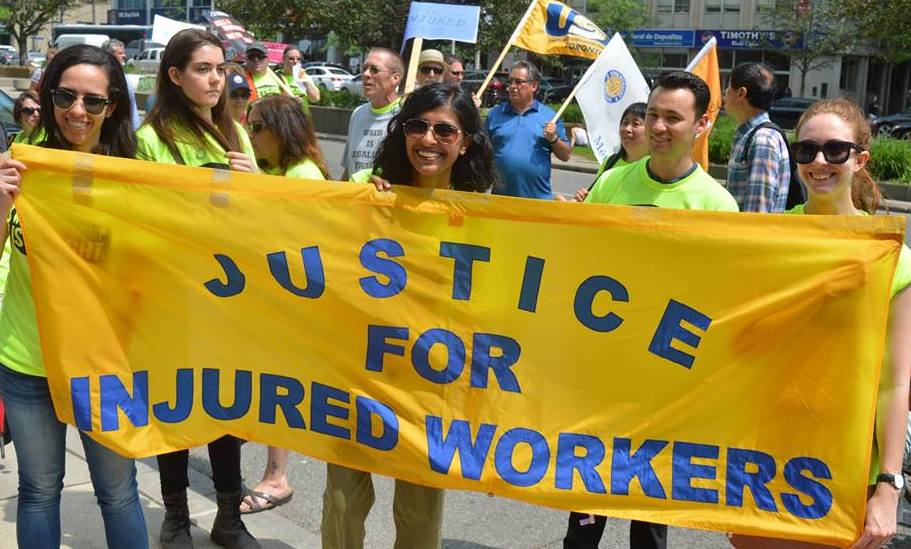 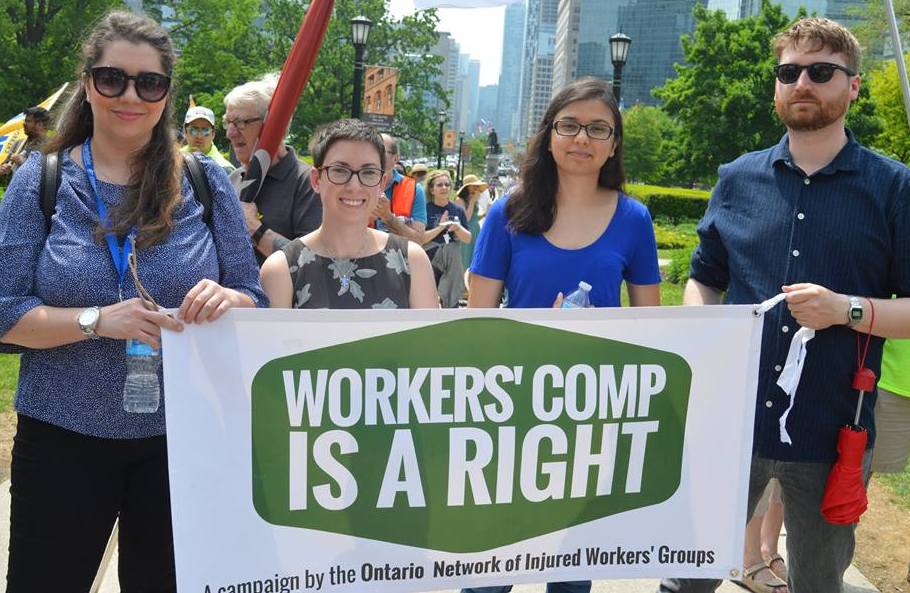


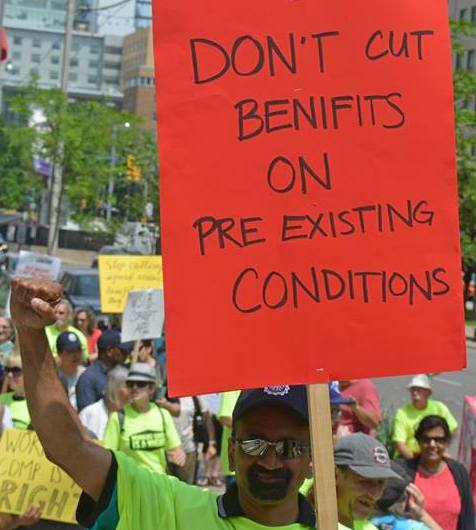 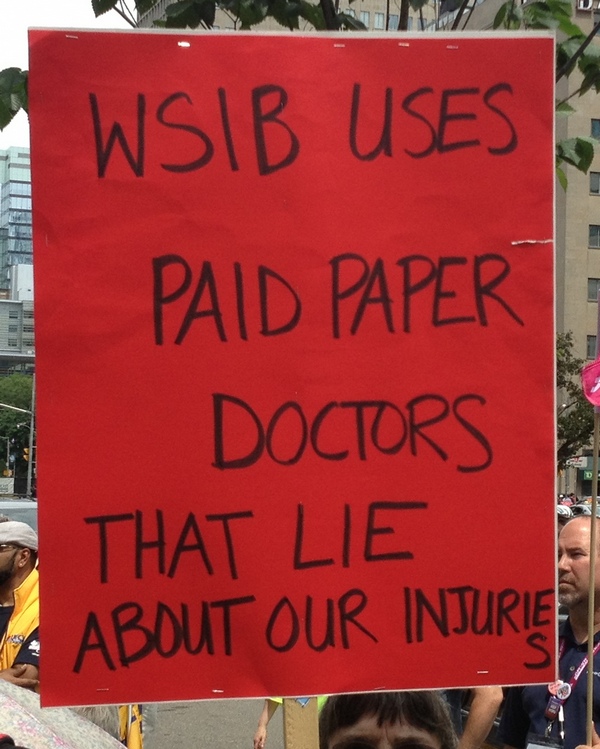 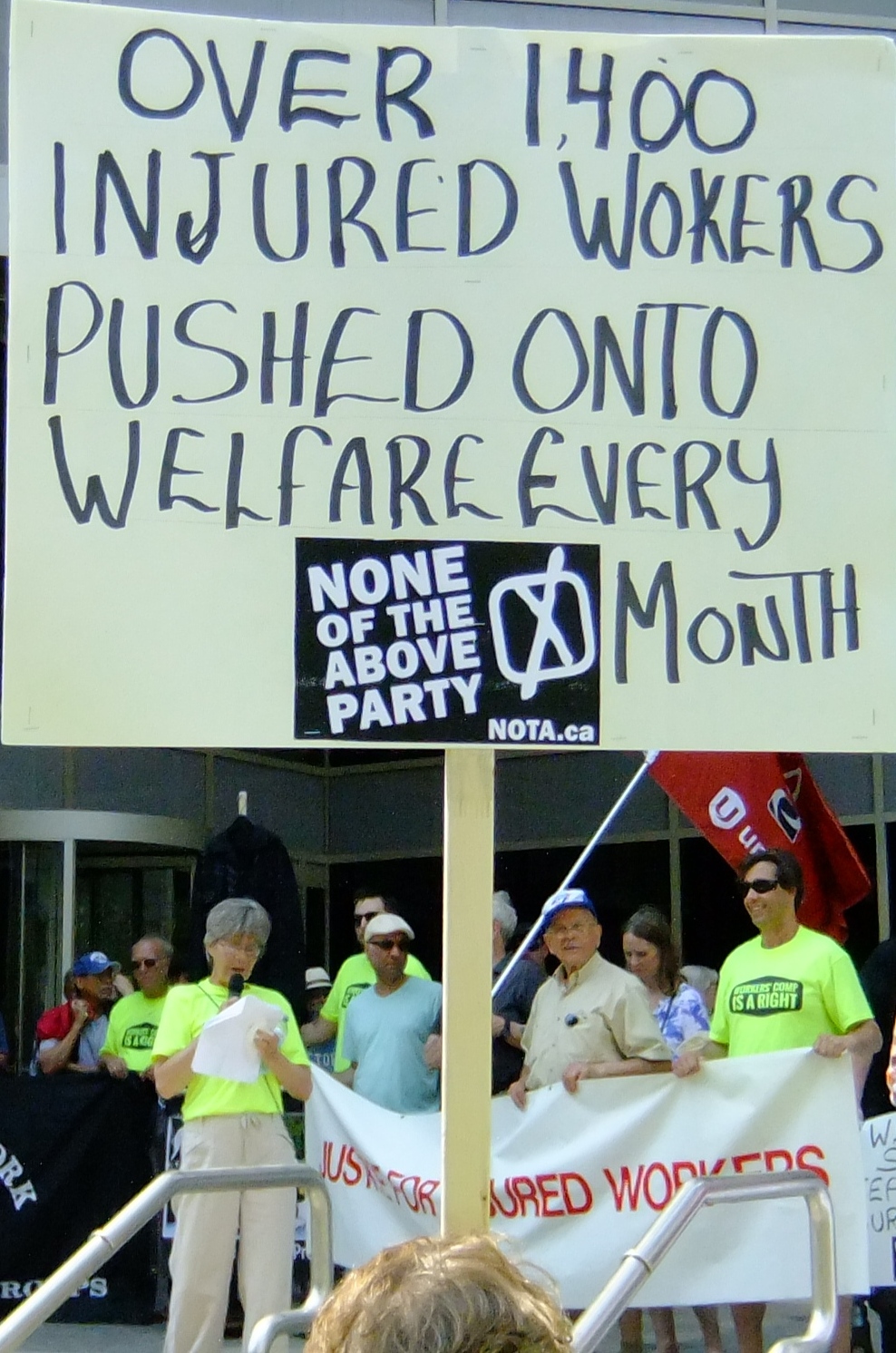
A militant march south from Queen's Park down
University
Avenue followed, the flags and banners held aloft and the
chanting of slogans drawing the attention of hundreds along the
way. At the Ministry of Labour the rally was joined by 200
Canadian Union of Public Employees members who took a break from
their convention to join in. One of the speakers at the Ministry
of Labour was Janice Hobbs Martell who travelled from Massey to
speak about the case of her father the late Jim Hobbs who had
died last year of work-related illness because he, and thousands of
other miners, were
forced to inhale MacIntyre Powder allegedly to prevent silicosis, but
it instead led to many of these miners
dying of cancers and other occupational diseases. Janice Hobbs Martell
spoke about her fight to
get justice for her father and other victims and to raise
awareness so that such abuse of workers' health and safety never
takes place again.
Ontario Network of Injured Workers' Groups President
Willy
Noiles at the close of the rally thanked everyone for making the
35th Ontario Injured Workers' Day a great success and pledged to
keep up the fight no matter which party wins the Ontario election
June 7.
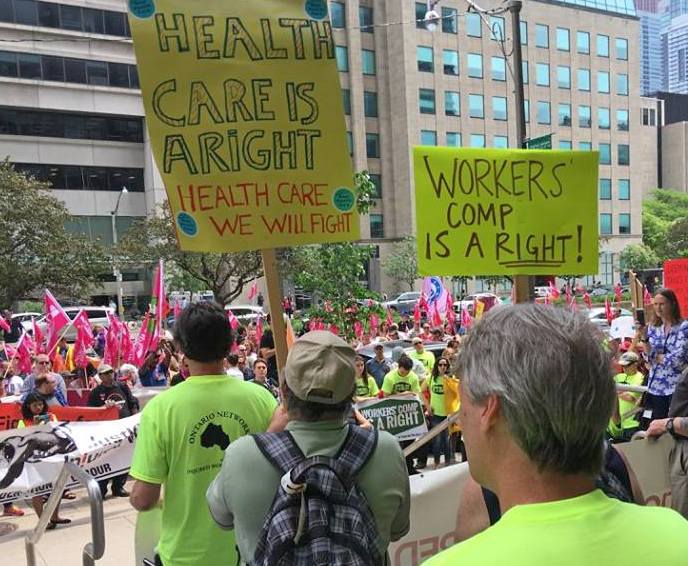 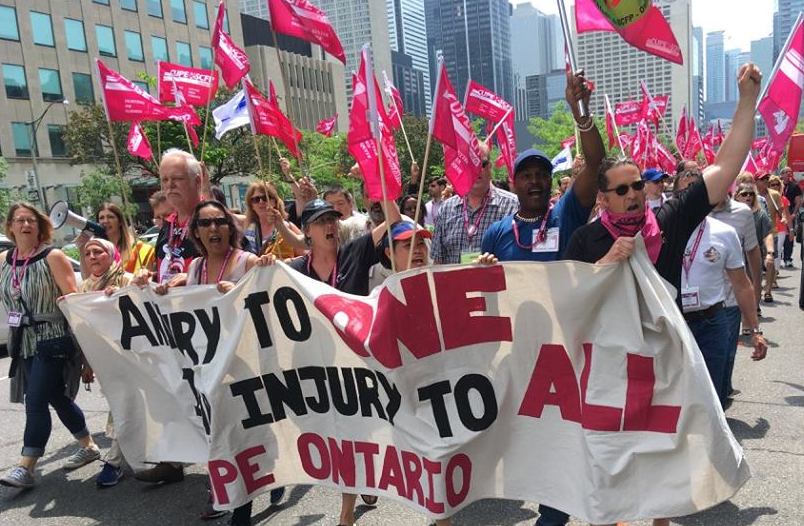 
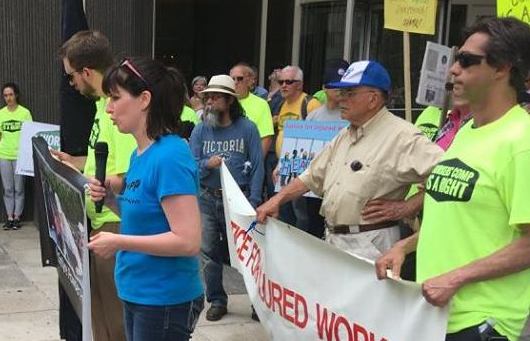 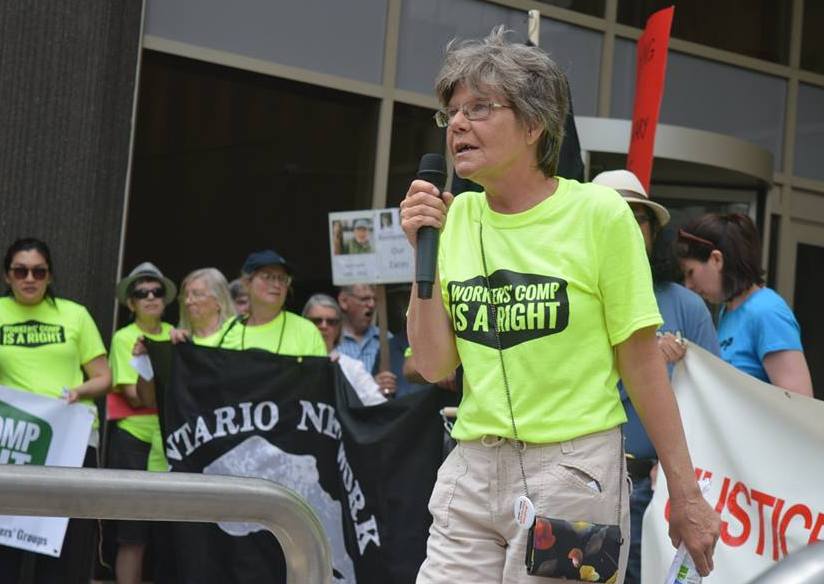

Town Hall
Meeting on Ontario Election
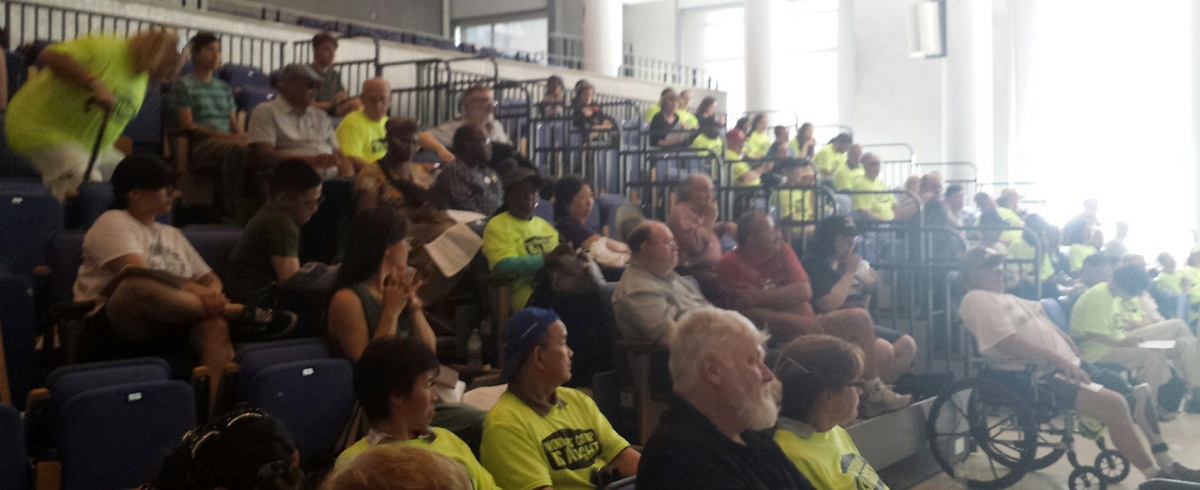

Following the march and rally some 80 people participated in a Town
Hall candidates meeting
and discussion on the concerns of injured
workers in the context of the province-wide Workers' Comp Is a Right
campaign and the Ontario election.

Actions Around the Province
Actions were held on May 31 and
June 1
in Peterborough, London, Windsor and Thunder Bay as part of the
province-wide Injured Workers' Day and the campaign for workers'
compensation to be guaranteed for all workers as a right.
Peterborough
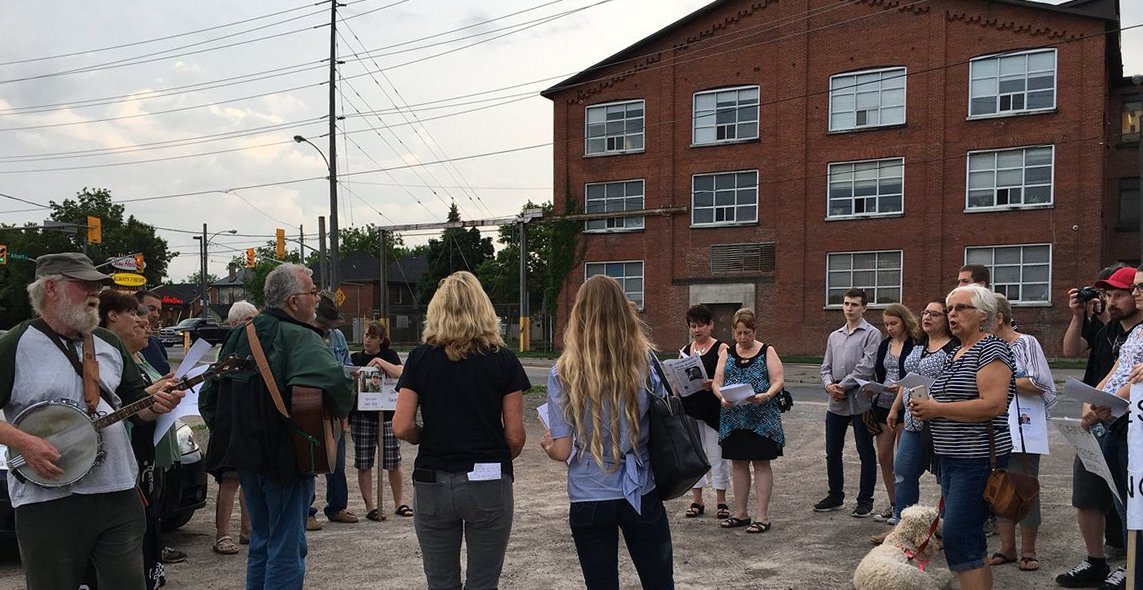
On the eve of Injured Workers' Day, working people in
Peterborough held a candlelight vigil to pay tribute to those injured
or killed on, or made ill by, their job. A major presence were
General Electric (GE) workers suffering from industrial diseases, their
widows and their families who are fighting for just compensation.
Everyone gathered at the GE plant, then marched past the Peterborough
& District Labour Council monument to the Quaker Oats Fire monument
in Millennium
Park.
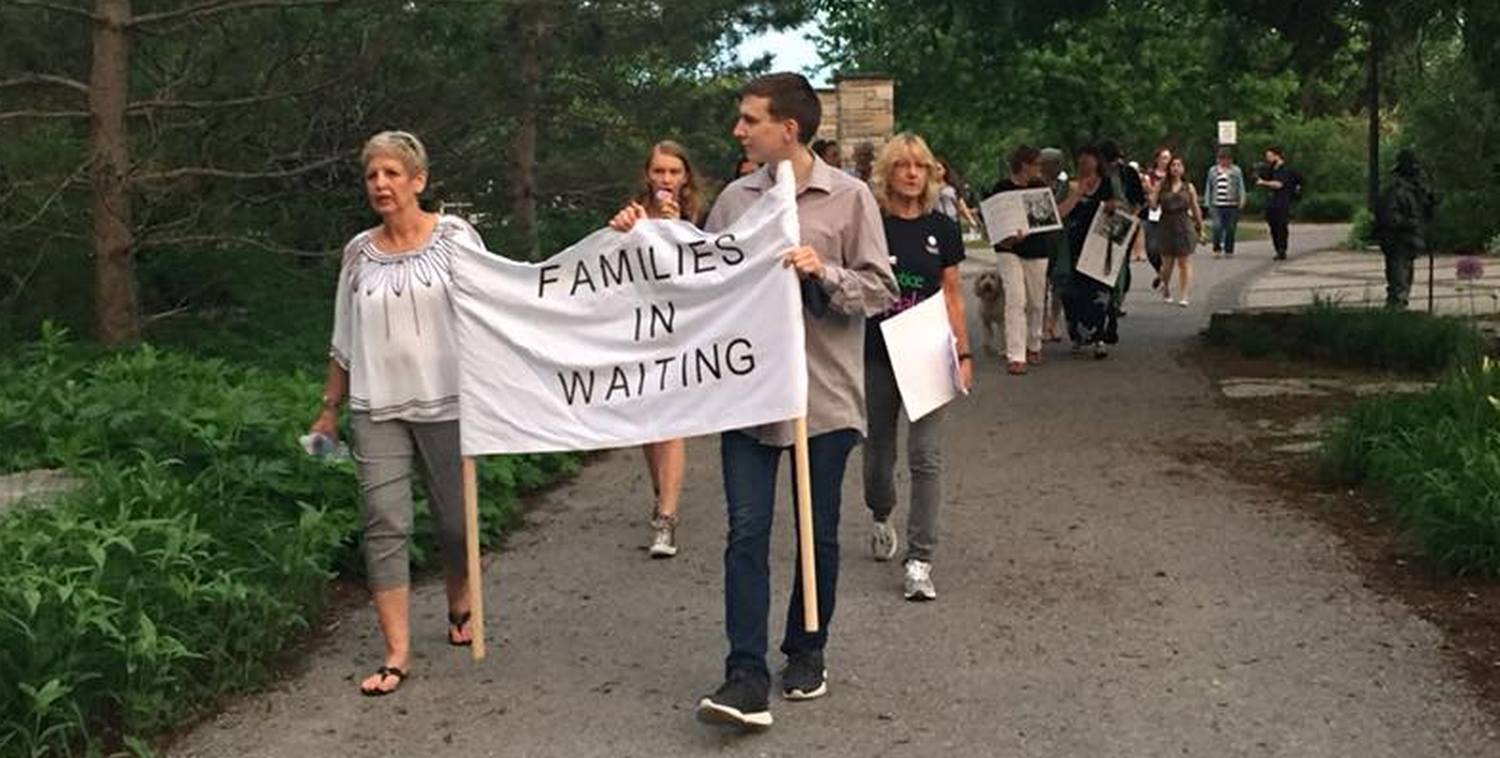

Singers and trade union activists George Hewison,
Brenda
Wall, and Natasha Luckhardt led the vigil with songs. St.
Catharines health and safety activist Bruce Allen spoke about a
similar group in Sarnia. Several family members and retired
workers spoke the names of former GE workers who have died.
Windsor
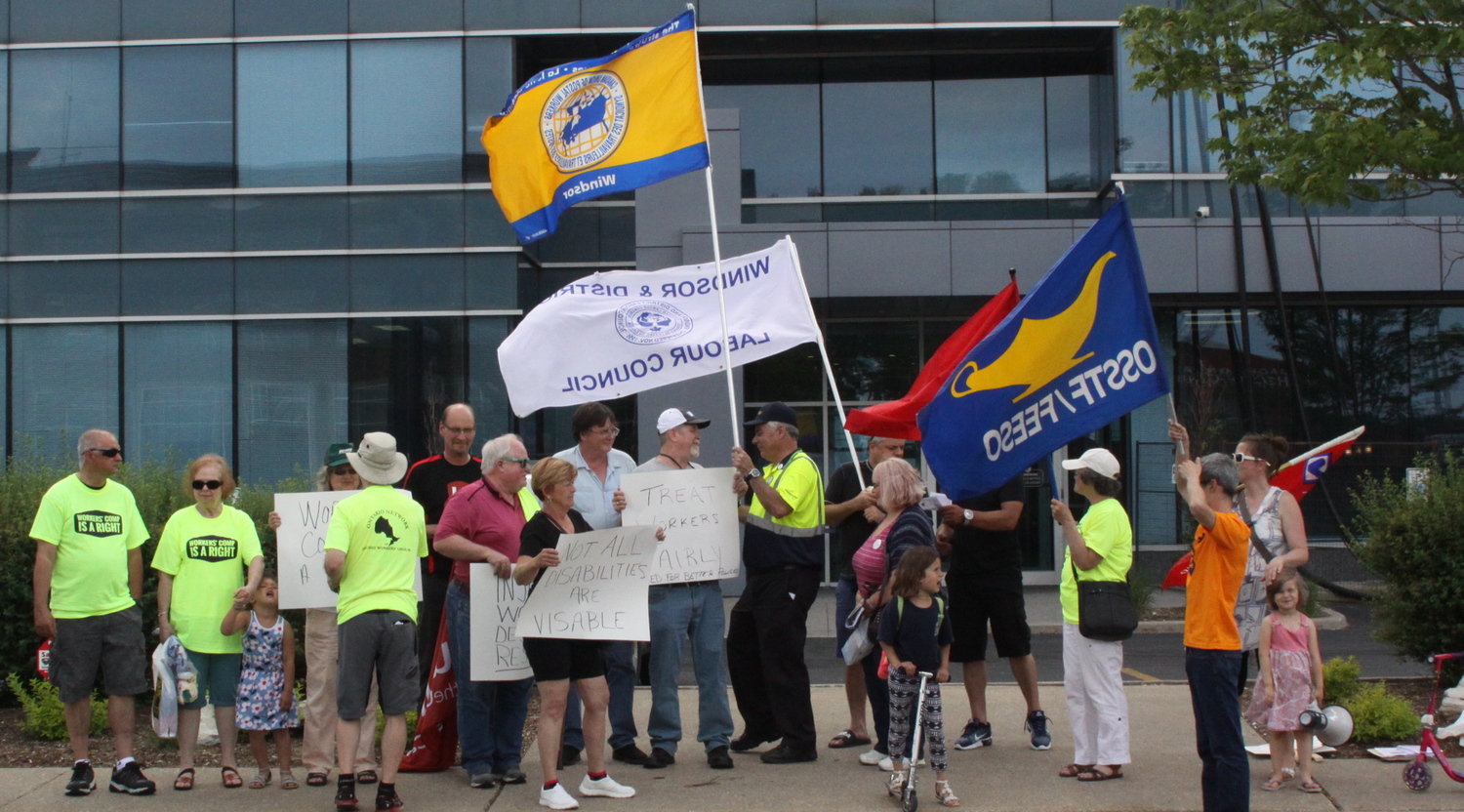
A spirited action on Injured Workers' Day took place in
Windsor in front of the offices of the Workplace Safety Insurance
Board. In addition to taking up the Workers' Comp Is a Right
campaign, the Windsor event was also held to commemorate Rolly
Marentette who died a year ago. Marentette was a longtime
activist for workers' health and safety in Windsor who always
called on working people to speak for themselves especially in exercise
of their right to refuse unsafe work and in defending injured workers
against unjust treatment by government agencies such as the WSIB.
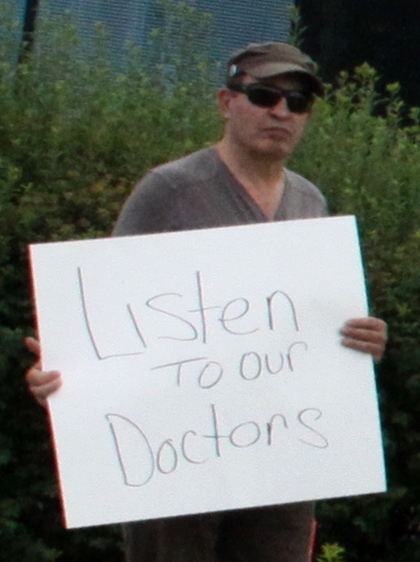 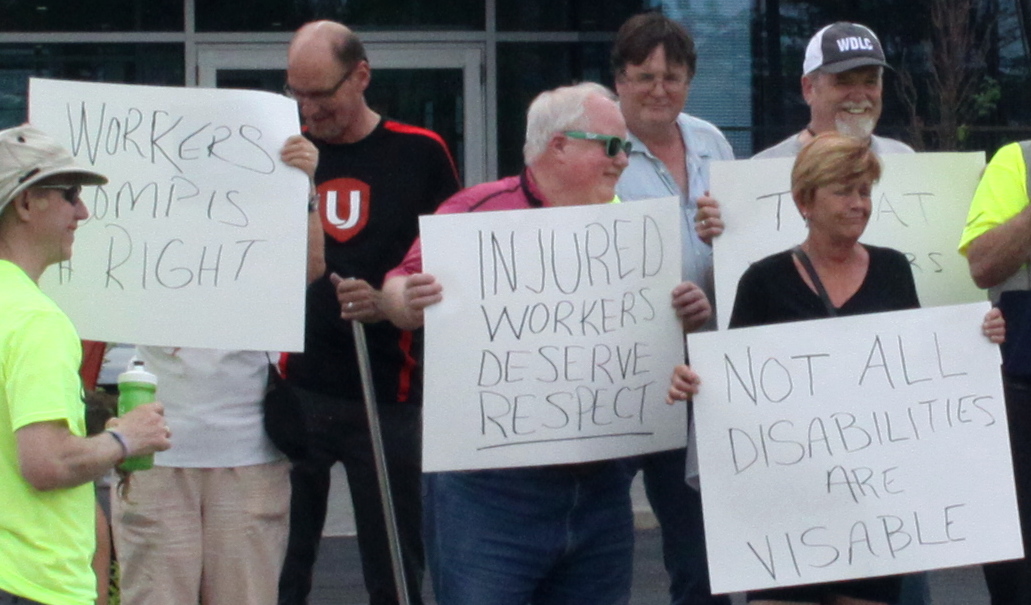
London
Injured workers in London made sure their voices were
heard
in days before election day. On May 30, they rallied outside a
Progressive Conservative
rally to demand justice for injured workers and denounce
governments and big political parties for ignoring the plight of
injured workers and their families. Two days later on June 1, they
rallied at the entrance to
Victoria Park for Injured Workers' Day.
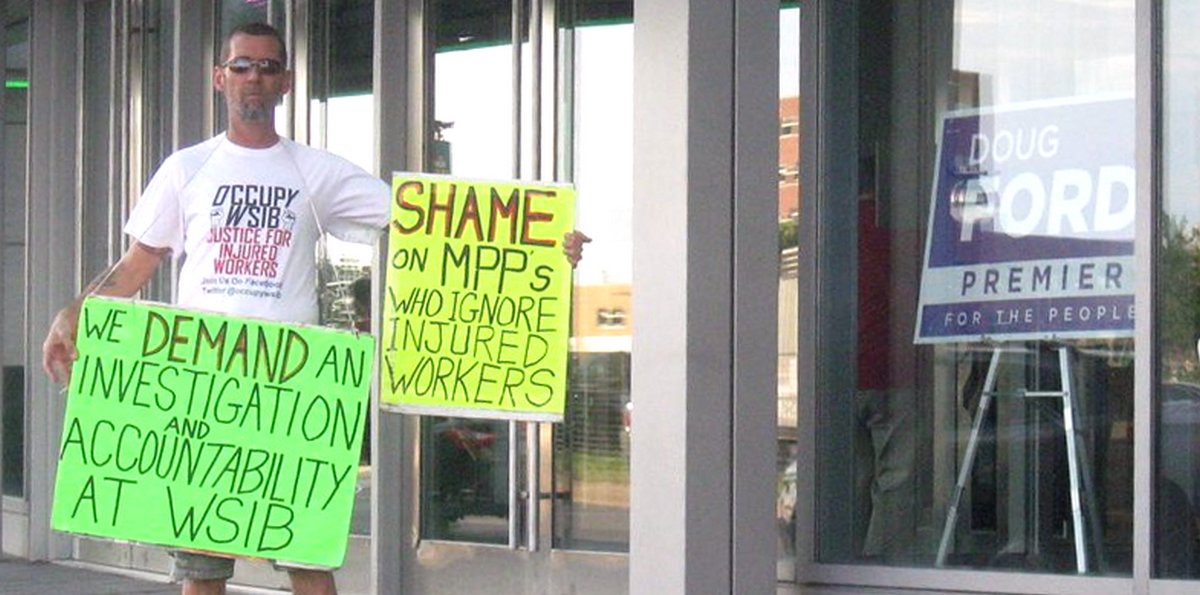
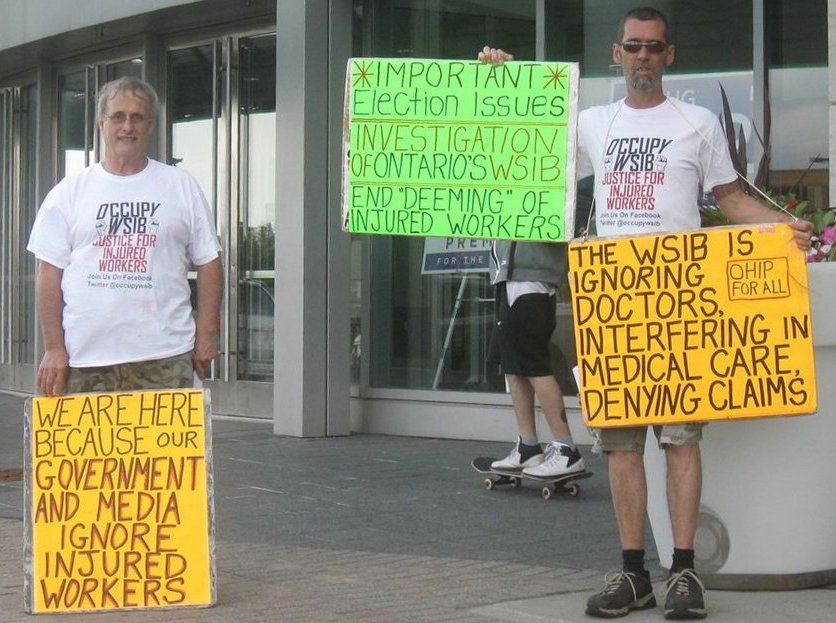 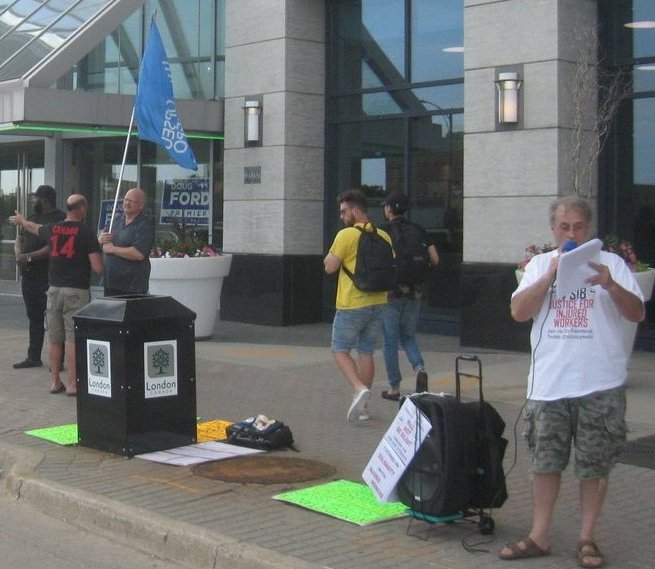
Outside a Progressive Conservative rally, May 30, 2018.
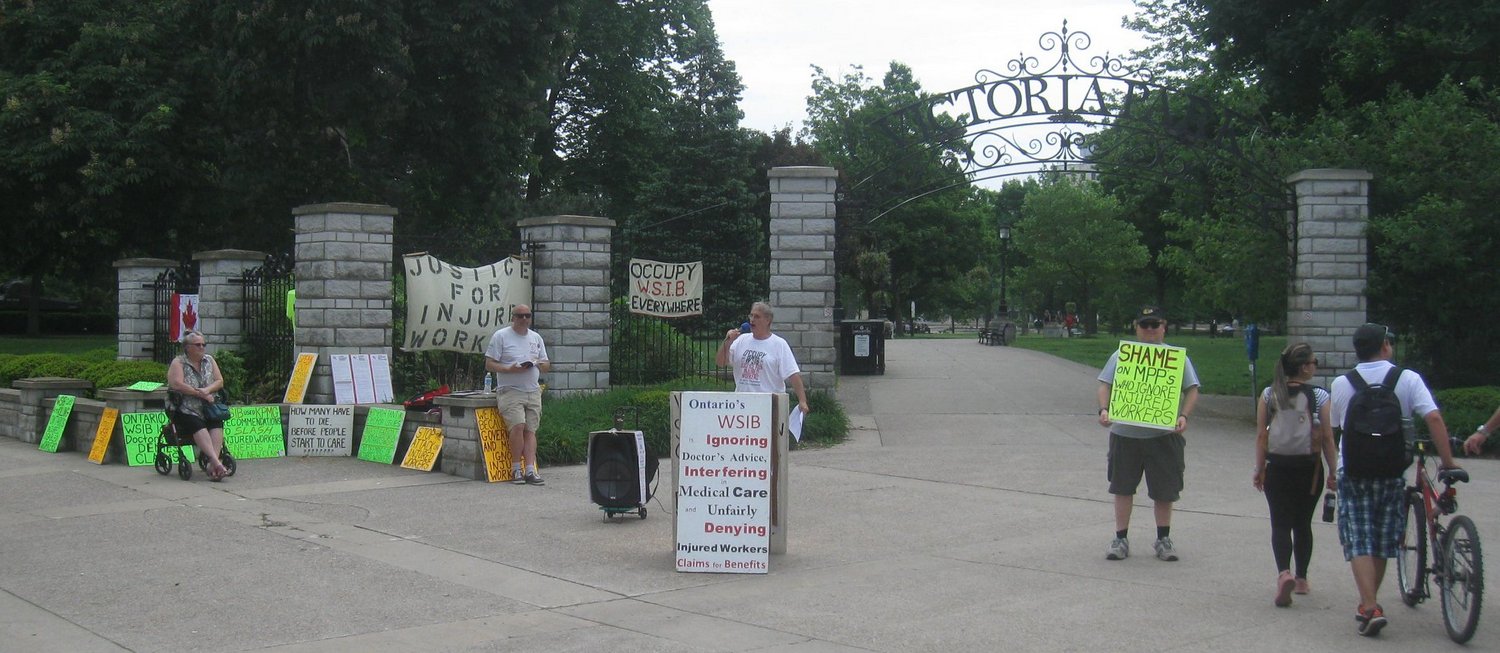
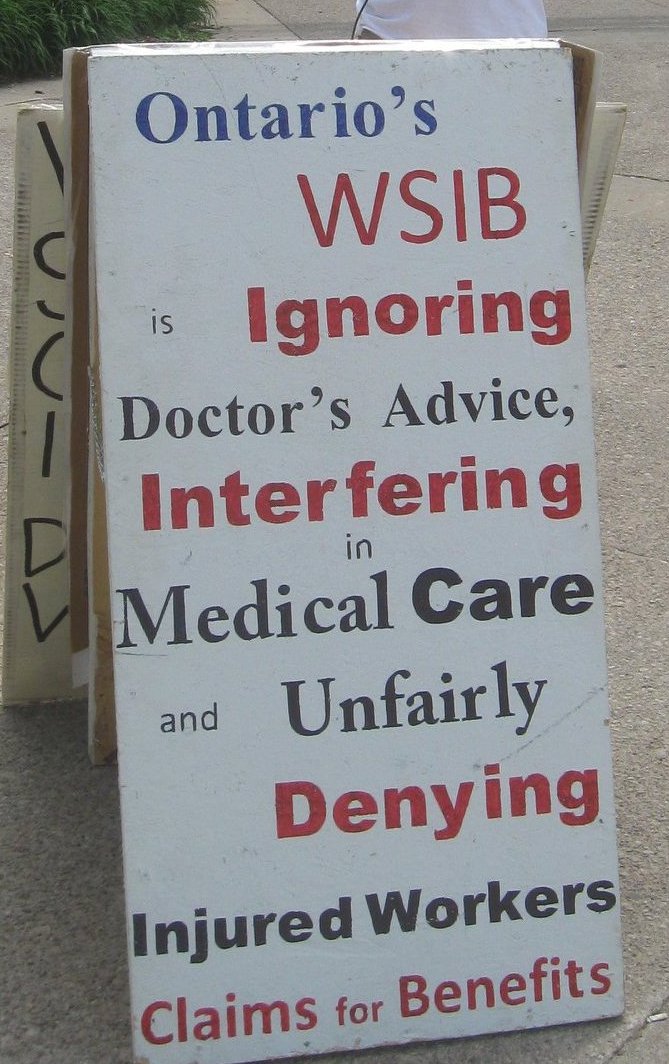 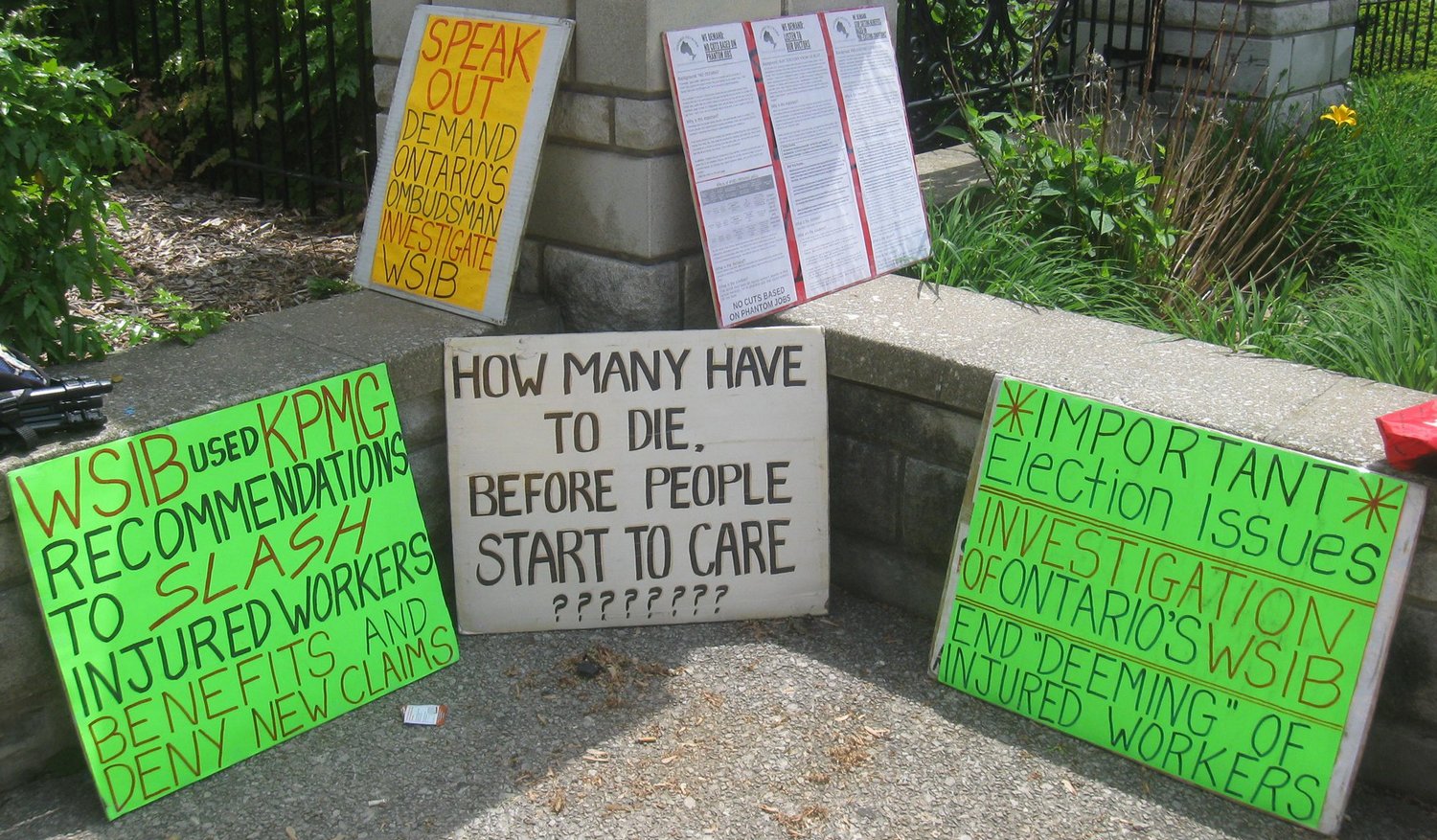
Injured Workers' Day in London at Victoria Park.

Peterborough General Electric Retirees' Proposals
for Workers' Compensation Reforms
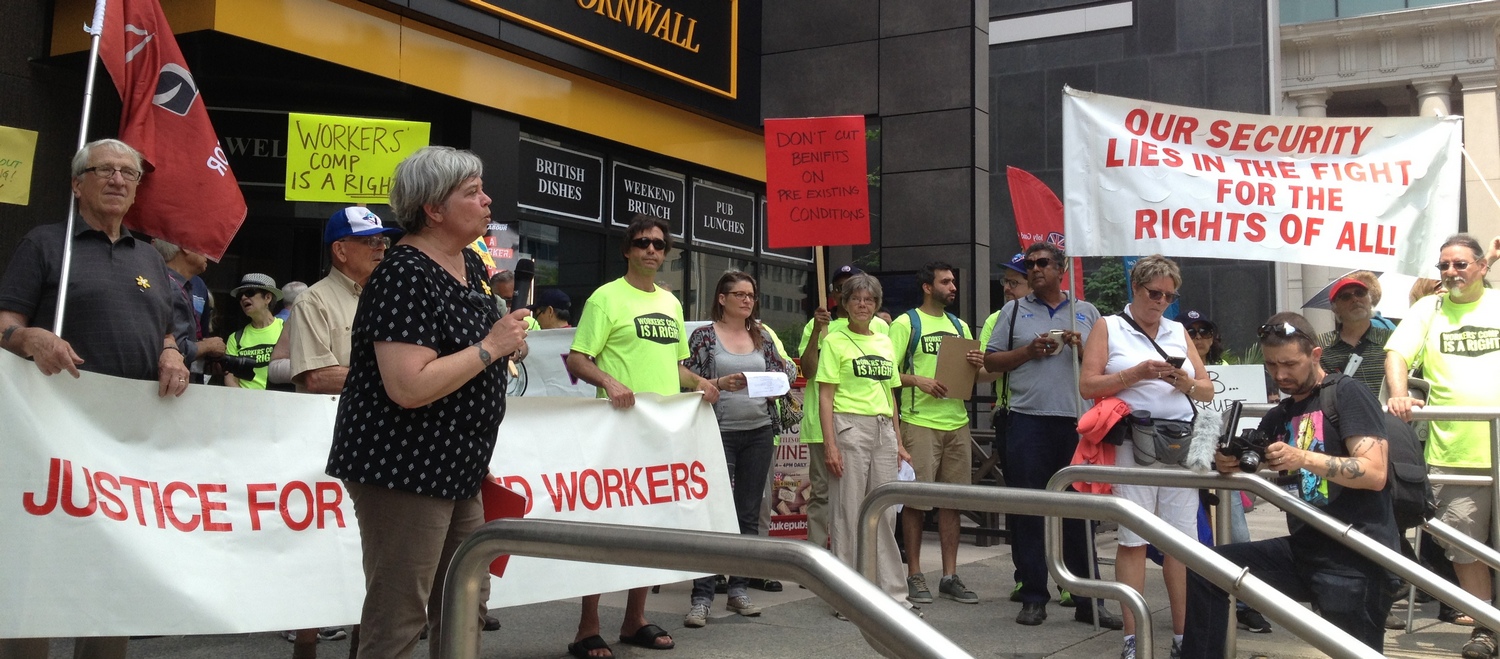
Representative of GE retirees Sue James speaks outside Ministry of
Labour June 1, 2018.
The following
"Manifesto for a Reformed, Just, and
Democratic Workers' Compensation System" was circulated at the
June 1 Ontario Injured Workers' Day Rally in Toronto by the GE
Retirees Occupational Health Advisory Committee, Unifor Local
524.
***
WORKERS' COMPENSATION IN CRISIS: Ontario's worker
compensation system is in crisis when it comes to fair and just
compensation for injured workers. Not a day goes by without a
news story describing serious injustices carried out by the
Workplace Safety and Insurance Board (WSIB).
Shockingly, these are just a small fragment of what
workers
and their representatives have been reporting about the Board's
questionable practices, designed to deny claims or cut benefits.
Historically, the Board's current practices represent a major
deviation from the founding principles set out by Chief Justice
William Meredith in 1914. These founding principles were set to
create a "no-fault workers' compensation" system, to assist
workers injured or made sick from work.
WHAT'S IN A NAME? A great deal! Workers' compensation
has
evolved into a system that largely serves the interests of the
employers. This is reflected in the change of name from "The
Workers' Compensation Board" to a "Workplace Safety and Insurance
Board" during the Mike Harris regime. This is confirmed in a
study by the Industrial Accident Victims Group of Ontario (IAVGO)
that found a large percentage of denied claims reviewed by the
Workplace Safety and Insurance Appeals Tribunal (WSIAT) were
based on little or no evidence. This was a general policy of
"proactive denial" formulated to reduce the Board's unfunded
liability between 2009 and 2015 by denying claims. This was
accompanied by another corrupt practice of forcing the Board's
"paper" doctors to give the opinion the Board desired. The
harassment and firing of Dr. Brenda Steinnagel, for refusing to
change her medical report to suit the Board's wishes to deny a
worker's claim, is a case in point.
THE CONSEQUENCES OF AUSTERITY: During that period of
proactive denial, rebates to employers increased by over 100 per cent
and
denied claims doubled. Benefits to workers were cut by 33
percent. This is not a mere coincidence!
With a mindset of a private insurance provider, the
WSIB
became exceptionally rigid, aggressive, and adversarial in
finding ways to deny or terminate workers' claims.
ABUSING THE VULNERABLE: Taking abuse another step
further
with a practice called "deeming," the board currently determines
if a worker is fit to work, often without medical evidence that
the worker is able to work, or contrary to his/her doctor's
opinion. Often there is no job to return to at the pay level of
the worker's previous job. This usually results in the Board
cutting benefits. In many cases this leads to poverty, frequent
re-injury, and psychological distress. A joint study from Trent
and MacMaster Universities found that 46 per cent of permanently
injured
workers were living below the poverty line.
Abuse doesn't stop there. Indeed, the WSIAT found that
the
Board had wrongly upheld 50 per cent of employer's abusive actions
against workers.
FAILING TO ADDRESS OCCUPATIONAL DISEASE: The
true extent of occupational disease remains largely unaddressed.
Only a small fraction of work-related disease claims are allowed.
Consequently, this leads to a distorted assessment for regulatory
and prevention purposes, and shifts the burden of work-related
disease onto our public health care system, families of victims,
and society in general.
Over the years questions have been raised by numerous
medical
and legal scholars who have identified numerous systemic
obstacles to disease recognition that include: an onerous burden
of proof requiring scientific certainty rejected by the Supreme
Court of Canada; legalized thresholds rather than exposure
guidelines; dismissal of doctors' assessments of
work-relatedness, or readiness for a safe return to work;
over-emphasis placed on the worker's medical history, or what
the Board terms a "pre-existing condition" rather than hazardous
workplace exposures; narrow focus on one chemical and one
disease, and an unwillingness to address mixed exposures and
disease clusters claiming that this is beyond the Board's legal
mandate.
These cluster cases are typically not investigated
appropriately, and the board refuses to accept this as evidence
of work-relatedness.
A PUBLIC INQUIRY DEMANDED: The exposure of these
questionable
practices has led to growing demand for a full scale public
inquiry into the operation of the WISB with a view to placing the
WSIB under democratic control. It is no longer tolerable to have
a worker compensation system based on the practices and policies
of a "private" insurance company, operating as a power unto
itself with little public oversight. Workers demand and deserve a
workers' compensation system that addresses the needs of those
who are injured and made sick from work. Time's run out! It's
time to act!
WHAT NEEDS TO BE ADDRESSED:
- The systemic obstacles to
occupational disease recognition including: onerous burden of
proof, ignoring doctor's assessments, over-emphasis on medical
history, rigid thresholds, ignoring exposure conditions, paucity
of occupational health research.
- Off-loading of the social and
economic cost of injury and disease onto our public health care
system, families and society in general.
- Abolish the unjust and
harmful system of "Deeming."
- Emphasis on "pre-existing
conditions" to deny claims.
- The use of "paper doctors" employed
by the board to deny claims without a medical exam.
- Forced
return to work.
- Inordinately long wait times for adjudications.
- The exclusion of migrant workers from the worker compensation
system.
- Address the abuses of the experience rating system.
-
Abolish time limits for filing claims and appeals.
- Restore the
right to oral hearings.
- Restore the name of the Workers
Compensation Act and the Board.
CONTACT: Sue James, Advisory Committee, Chair: suejames
@cogeco.ca

PREVIOUS
ISSUES | HOME
Website: www.cpcml.ca
Email: office@cpcml.ca
|

